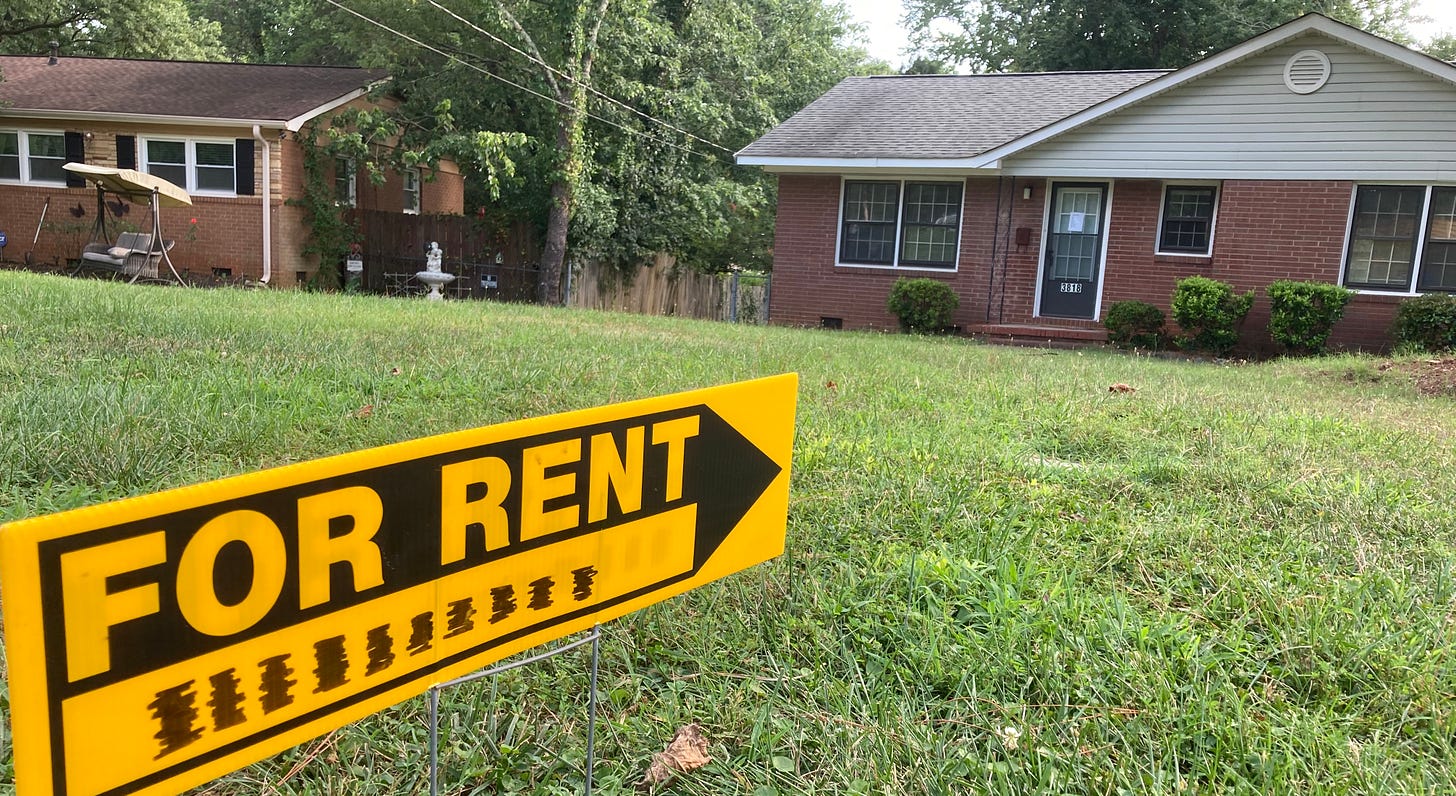The landlord view of Charlotte’s housing woes
Plus: Charlotte jobless rate falls but remains high; N.C. warns about mental health and substance abuse; Decision expected on reopening this week; Harris Teeter salad bar less healthy than usual
With jobless benefits cut and eviction filings rising, industry buzzes about what comes next; ‘a real bind’ if rent’s not paid

by Tony Mecia
The number of people unemployed in the Charlotte region has more than doubled in the last year, extra jobless benefits have ended and last week, a national moratorium on evictions expired.
All those factors have housing advocates warning of a wave of struggling renters who could be evicted for nonpayment as soon as this month — although North Carolina’s courts are backlogged with cases that could take weeks to resolve. Local nonprofits have reported that interest in rental assistance programs has ballooned since the start of the pandemic. Nationally, some have warned of a looming housing “apocalypse.”
It seems as though we hear a lot about housing activists and government efforts and renters. But you seldom hear the perspective of the owners of the properties where down-on-their-luck renters live.
For the latest on the changes in rental housing and a landlord perspective, The Ledger turned to Matthew Tringali, co-founder of HomeVault Property Management. It manages 850 properties in six states, including 170 in Charlotte.
More paying late: He tells us that in ordinary times, about 15% to 20% of renters pay late, and that the owner files evictions on around 1% of properties. Since the pandemic started, he’s seen the number of people paying late rise by about 5 to 10 percentage points.
Tringali says that contrary to occasional portrayals, landlords aren’t villains — they’re often ordinary people with expenses and who depend on rental income. He says the whole industry is abuzz about pending legislation in Congress that could include another moratorium or rental assistance, as well as another round of stimulus checks, boosted unemployment benefits and other economic measures.
Remarks have been edited for clarity and length:
Q. What would be helpful for people to understand about where we are with rental housing right now?
The vast majority of rental properties are owned by people just like you and me and your readers. The vast majority are mom-and-pop people who own one or two rental properties. This is probably a house that they used to live in, and they moved at some point, and for whatever reason turned it into a rental property.
It is a real bind on them if the rent is not being paid.
When the CARES Act was passed, Congress did at least have the foresight to designate what they called “covered properties” — any properties that are either Federal Housing Administration or are securitized by Fannie or Freddie — that’s the vast majority of properties. What the CARES Act said was any property like that, you’re not allowed to file an eviction on it or charge late fees. But they did say to the banks who are servicing those loans that they have to provide some type of forbearance options for those borrowers.
The problem is that was inconsistently applied. Some banks said, “OK, fine — we can’t charge you this mortgage for the next four months, but the way the forbearance is going to work is as soon as we get to the end, you’re going to owe all that money.” Every bank handled it a little differently. It wasn’t this get-out-of-jail-free card for every borrower.
In addition, every landlord is going to have taxes, insurance, maintenance, management and homeowners’ dues to continue to pay on the property. While their tenants are not paying, the landlord is still on the hook to pay all those things. If the tenant puts in a maintenance request and says, “My HVAC is out” and all of a sudden this landlord has to pay $5,000 this summer to put a new HVAC in the property — well, they would have budgeted for that if they had been receiving rent for the last four months.
Q. What’s the background of most people who aren’t paying the rent?
I can’t personally speak to that. In one sense, it doesn’t really matter. Our job for our clients is to collect the rent, regardless of what’s going on. We try to work with the tenants however we can to make that happen.
Q. What’s going to happen now? Is it going to get worse now that the unemployment supplement seems like it’s running out and the moratorium on evictions is lifted?
That’s the big question. Literally all property managers are all abuzz right now trying to figure out what Congress is going to do.
We are now, as of [last week], able to charge late fees. We’ve done that, applied our late fees. We’re not trying to be punitive, but it’s a way to get the tenants’ attention. It’s saying, “We’re trying to get back on track here.”
We are now able to file evictions again. But that could change tomorrow. Congress could change everything.
Q: The sheriff’s department had said it wasn’t going to serve eviction papers, and now it looks as though they are reluctantly getting back to that. Has that had any effect?
We had evictions that were in process when the CARES Act came in, and we were ready to remove the tenants. We had won possession of the property. Then the sheriff’s office said they were just not going to serve the writ. Those landlords in particular were very upset. That really caused a hardship for them. They had already gone through the legal process to gain possession of the property then couldn’t take possession of the property.
Q: What do you say to people who say, “Landlords need to be more understanding here, and you shouldn’t be filing evictions on people who have lost their jobs?”
What I would say is some landlords have that luxury and some don’t. Some landlords are taking that opportunity to do that.
The CARES Act said, “We going to give you $1,200. We’re going to give you an extra $600 a week in additional unemployment benefits.” That money was given in large part so you could afford to pay your bills.
Now if that wasn’t enough money, I get that. It probably wasn’t for a lot of people. I don’t want to sound insensitive about that. But it doesn’t therefore make it the landlord’s responsibility to be that social safety net.
Q. Do you have landlords who are struggling?
We have not many but a few properties who are in this status, where we ordinarily would have filed an eviction and removed the tenant from the property. And we were not able to do that. And the tenant has now racked up $5,000 to $10,000 of money that they owe to the landlord that we’re not able to collect. These landlords are very, very financially stressed out over that. It’s putting them in a real hardship.
Q. Are landlords sometimes portrayed as villains?
They are. For the typical person, that’s rare. A lot of media stories, where if you have to come at it from a certain angle, the landlord is the easy person to attack. Housing is a sensitive issue. Nobody gets excited about removing somebody from their housing. Nobody feels good about that. But again, it doesn’t change the fact that the landlord has to pay their bills.
You have to think of it like you do any business. If you have other business owners who own other businesses, they have bills to pay, too. Does that mean they should start giving their goods away for free to their customers? Nobody is looking at the grocery stores and saying, “Why aren’t you giving the food away for free?”
Charlotte’s jobless rate recovered quickly in June
The Charlotte area’s unemployment rate plunged to 8.4% in June, according to new figures from the Labor Department.
The new numbers provide a better sense of the scope of economic turmoil we’ve been undergoing since March.
You know things are bad when the unemployment rate plummets and is still 8.4%. In May, it peaked at 13.2%. So we’re heading the right direction, but there are plenty of reasons to think that the recovery will slow. We have whole industries that remain shut, and others are limping along.
The numbers show that in June, the number of people unemployed in the Charlotte region was about 112,000. That’s down from 174,000 in May but still double the number from February.
On the other hand, if you’re looking for historical comparisons, you can take some solace in knowing there were more people unemployed in the Charlotte region in every month of 2010 and 2011 than there were in June 2020. The Great Recession, centered in financial services and housing, hit Charlotte hard, and it took years to recover.
This one cut deeper but has bounced back much more quickly — at least so far. —TM

The Charlotte area’s unemployment rate was 8.4% in June, down from a peak of 13.2% in May, according to figures released by the Labor Department last week.
Today’s supporting sponsors are Landon A. Dunn, Attorney at Law in Matthews:

… and T.R. Lawing Realty:

Decision this week: Keep reopening, or wait longer?
Gov. Roy Cooper is expected to decide this week if the state will continue reopening its economy.
His existing order keeping North Carolina in so-called “Phase 2” expires on Friday at 5 p.m. A move into the next phase could allow gyms, yoga studios, bars, movie theaters and museums to open. It could also increase capacity limits at restaurants and raise the number of people allowed to congregate at indoor and outdoor gatherings.
The figures that state officials say they examine to help make that decision actually look more favorable now than they did a few weeks ago. The state has said it looks at a series of numbers to see if they are stable or falling over a two-week period. According to state data, in the last two weeks …
the average number of new cases statewide has declined
the number of Covid patients hospitalized is almost exactly the same
the percentage of positive Covid tests has declined slightly
the percentage of people showing up in ERs with Covid-like symptoms has fallen
Still, state officials usually give themselves lots of wiggle room to make these decisions, which they say are based on the data. They could choose to be cautious, or say they want to see if these trends of stabilizing or declining numbers continue. —TM
State cites surge in anxiety, depression, substance abuse
North Carolina’s top health official is warning of recent spikes in mental health issues and substance abuse related to the pandemic, lockdowns, job losses and so on.
At a news conference last week, Department of Health and Human Services secretary Dr. Mandy Cohen said:
We are seeing concerning evidence of sharply increased rates of anxiety and depression in North Carolina, especially among younger people. We are also seeing higher rates of emergency room visits for substance overdoses and higher rates of binge drinking.
Officials said the number of people suffering from depression and anxiety has tripled, and the number of patients showing up in the state’s emergency rooms suffering from opioid overdoses is up 15%. They rolled out what they said was a new acronym to cope with stress and anxiety, called “SCOOP”:
S: Stay connected to family and friends.
C: Compassion for yourself and others.
O: Observe your use of substances.
O: OK to ask for help.
P: Physical activity, which improves mood.
They also encouraged people who need help to call the statewide 24-hour hotline, 855-587-3463.
Since the spring, The Ledger has been chronicling some of the health side effects related to Covid in our “Hidden Health Crisis” series, including examining anxiety and depression and loneliness. —TM
Big Saturday night in Charlotte: Watching planes take off, land


In brief:
Covid must-read: WBTV anchor Molly Grantham posted a highly personal must-read Facebook message on Sunday, detailing the experience of having her entire family come down with Covid just days after she gave birth to her third child. “The thought crossed my mind that if the newsroom had seen ‘ten days old’ on a press release about daily Covid testing statistics, we’d probably try to track that family down and see if they wanted to share their story. Yet, it wasn’t some nameless, mysterious family. It was me. My kids. My baby,” Grantham writes. Grantham, her husband and three kids are thankfully recovering.
Homeless encampment suit: The owner of a parcel of land on North College Street near uptown is suing an adjacent property owner for allowing a homeless encampment that “is continually filled with trash, debris and human waste.” The suit says the tent village, filled with hundreds of residents, is a nuisance and should be removed. It cites “41 crimes reported on the block, including 25 assaults, eight robberies and six thefts.” The suit says the land used for the encampment is owned by WorldCom Network Services, which is now part of Verizon. (WBTV)
Preserving historic hotel: A group is hoping to persuade Inlivian, formerly known as the Charlotte Housing Authority, to abandon plans to build affordable housing that would require the demolition of an uptown building that dates to the 1940s. Inlivian has announced plans to build 368 mixed-income apartments on land uptown that includes the Hall House, also known as the former Barringer Hotel. “There are not a lot of things like this left in Charlotte, and people are tired of watching our history get demolished,” said group leader Clayton Sealey, who is active on social media under the name CLT Development. (Observer)
Convention with no media: The scaled-down Republican National Convention to be held in Charlotte this month will be closed to the press, a convention spokesperson said. “Given the health restrictions and limitations in place within the state of North Carolina, we are planning for the Charlotte activities to be closed press Friday, August 21 - Monday, August 24,” a statement said. It would still be broadcast, but no reporters would be allowed on site. (CNN)
Defiant bar shuts: Pins Mechanical Co., a South End bar that opened on Thursday in defiance of state orders that keep bars closed, shut its doors again on Friday after talking with police. The owner had told TV stations that he needed to open to survive. Some customers arriving Friday were disappointed that Pins Mechanical had closed again. “We didn’t know! We were ready to meet our friends!” several women told WBTV. Another patron told the station: “I love technicalities, love grey areas. They are not a bar, first of all. I feel like they’re an awesome bowling alley. They have a food truck outside, so that’s food.” (WBTV)
Transit funding strategy: Transportation leaders from three cities that recently proposed tax increases to pay for public transit shared strategies last week with Charlotte officials who want to expand light rail and the streetcar. “Representatives from Austin, Broward County, Fla. and Nashville joined the 25-member [Charlotte Moves Task Force] to talk about how they succeeded (or failed, in Nashville’s case) at convincing the public to support higher spending on expanded transit and other transportation options.” (UNC Charlotte Urban Institute)
Another restaurant closing: Corkbuzz in SouthPark has permanently closed, saying it was unable to “pivot in a substantial way” to survive the fallout from Covid-19. (Biz Journal)
Loves me some internet: at the HT salad bar
From Reddit:

Taking stock
Unless you are a day trader, checking your stocks daily is unhealthy. So how about weekly? How local stocks of note fared last week (through Friday’s close), and year to date:

Need to sign up for this e-newsletter? We offer free and paid subscription plans:
The Charlotte Ledger is an e-newsletter and web site publishing timely, informative, and interesting local business news and analysis Mondays, Wednesdays, Fridays and Saturdays, except holidays and as noted. We strive for fairness and accuracy and will correct all known errors. The content reflects the independent editorial judgment of The Charlotte Ledger. Any advertising, paid marketing, or sponsored content will be clearly labeled.
Got a news tip? Think we missed something? Drop us a line at editor@cltledger.com and let us know.
Like what we are doing? Feel free to forward this along and to tell a friend.
Searchable archives available at https://charlotteledger.substack.com/archive.
On Twitter: @cltledger
Sponsorship information: email editor@cltledger.com.
Executive editor: Tony Mecia; Managing editor: Cristina Bolling; Contributing editor: Tim Whitmire; Reporting intern: David Griffith


